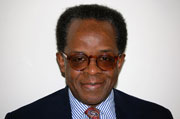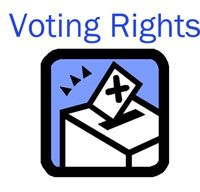
The right’s war against voting rights
By Lee A. Daniels, George Curry Media Columnist
Those who’ve wondered how, after the Civil War abolished slavery, America became – while a democracy in rhetorical terms – in reality an apartheid state should be paying close attention to the machinations of the Republican Party and the conservative movement.
They’ve been providing example after example of how democratic forms can be used to deprive some citizens of their rights.
Nowhere is that more evident than in the right-wing effort to limit some Americans’ right to vote in order to restore white conservative rule.
From the Supreme Court’s 2013 gutting of the landmark 1965 Voting Rights Act in Shelby County, Ala. v. Holder to a flood of laws and rules enacted by Republican-controlled state legislatures during President Obama’s tenure, conservatives have been trying to undermine two of the society’s most powerful progressive forces of the last half-century.
The first is the empowerment of the Black vote produced by the legislative victories of the 1960s Civil Rights Movement. The result: the Black vote became the bedrock of the Democratic Party, and the foundation of President Obama’s election and re-election victories.
The second is the demographic revolution of these past decades that has produced the increasingly influential vote of other American groups of color – namely, Latino, Asian, and Muslim Americans. Substantial majorities of these groups vote Democratic, too – at the very time the GOP has deliberately become even more a “white people’s party.”
A set of striking statistics tells the tale: Data gathered by the Cook Political Report show that 87 percent of House Republicans are white males, compared to 43 percent of House Democrats, and that the median composition of congressional districts represented by Republicans is 76 percent white, while the median Democratic district is 49 percent white. Both “diversity gaps” are the widest they’ve ever been.
In other words, the GOP has used the legislative gerrymandering process to literally gather conservative voters into geographical “fortresses” primarily in exurban and rural areas where there are only small numbers of Americans of color and progressive-leaning voters to be found. It’s rolled the dice that laws and rules enacted by Republican-dominated state legislatures will block enough voters of color from the ballot box in this year’s presidential contest for them to re-gain the White House with, essentially, just white conservative voters. Further, its long-game strategy is to continue to use those measures to keep control of a majority of state legislatures and of congressional House districts.
A central plank of that plan is the latest conservative white-rule gambit before the U.S. Supreme Court: Evenwel vs. Abbott. At first glance, the case, coming from Texas and seeking a change in how legislative districts for the state senate there are drawn, seems simply to ask a neutral question: Should state legislative districts be based on the total number of people living there (including children, legal immigrants who’ve yet to become naturalized citizens, ex-offenders who are barred from voting, and so on) or just the number of eligible voters?
The U.S. Constitution doesn’t discuss the issue at all. But two U.S. Supreme Court decisions in the 1960s declared, without actually deciding the matter, that the 14th Amendment requires states to follow a “one person, one vote” rule. Those rulings, justly celebrated as hallmarks of American democracy, produced huge gains in political power for the high-population areas of cities and suburbs with their diverse and more liberal populations, compared to exurban and rural areas whose populations have always been overwhelmingly white and conservative.
However, Evenwel would reverse that expansion of democracy. It would have legislative districts be based only on the number of eligible voters because, it claims, the one-person-one vote standard unconstitutionally dilutes the influence of eligible voters in less-populous districts. In short, Evanwel would curtail the expansion of democracy and shift power to less-populous — and whiter — areas.
This is where Evanwel’s ‘eligible voter’ argument reveals itself. For throughout American history, that argument has been advanced principally by those seeking to exclude another racial or ethnic group from gaining electoral power.
So, it’s no surprise that the Evenwel case comes from Texas, which has experienced explosive growth of its Latino population during the past two decades.
And it’s no surprise that the Project for Fair Representation has played a central role in its journey through the legal system. This is the same organization that led the 2013 challenge to the Voting Rights Act of 1965 and has been the guiding force in the Fisher case now before the Supreme Court seeking to destroy the affirmative action plan at the University of Texas at Austin.
Its involvement leaves no doubt that the Evenwel challenge isn’t about fair representation but about white conservatives trying to block Texas’ surging Latino population from gaining political power.
Lee A. Daniels is a longtime journalist based in New York City. His essay, “Martin Luther King, Jr.: The Great Provocateur,” appears in Africa’s Peacemakers: Nobel Peace Laureates of African Descent (2014), Race Forward: Facing America’s Racial Divide in 2014 published by Zed Books. His new collection of columns is available at www.amazon.com





Be the first to comment